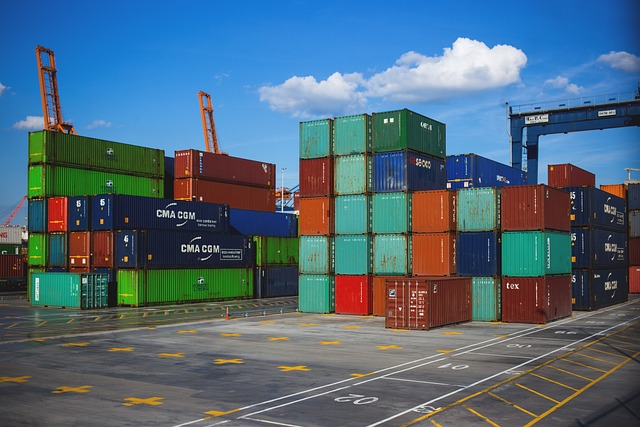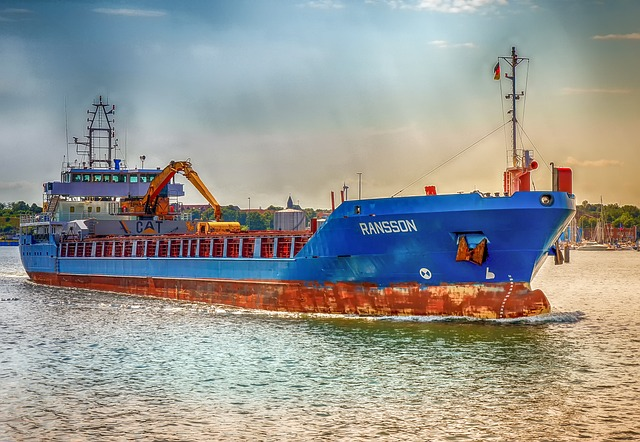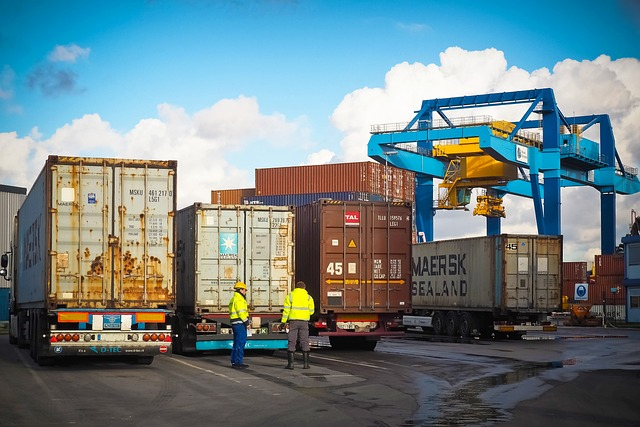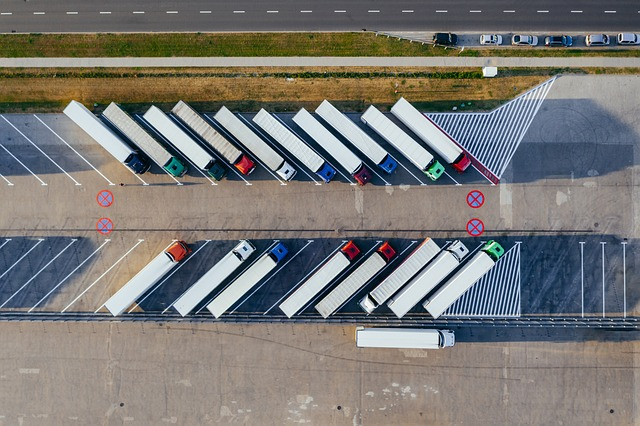It was a typical sunny day in Savannah when disaster struck: a container truck collided with a passenger car, causing serious injuries and significant damage. As Savannah’s port continues to grow and its shipping volume increases, so does the risk of Savannah container truck accidents. Understanding the risks and safety measures related to these accidents is crucial for both truck drivers, employees and the general public. In this post, we’ll explore the factors contributing to Savannah container truck accidents and the steps we can take to prevent them, ensuring safer roads for everyone.
Key Takeaways
- The Port of Savannah’s thriving shipping volume and infrastructure issues have led to an increased risk of container truck accidents in the area.
- Common causes include driver fatigue, distracted driving, improper cargo loading/securing and crane operator errors which must be addressed through effective safety measures.
- Motorists can reduce the risk by maintaining a safe distance from trucks, being aware of blind spots and anticipating wide turns.
The Impact of Savannah's Port on Truck Accidents

The bustling Port of Savannah plays a significant role in the local economy, but its impact on truck accidents cannot be ignored. With increased shipping volume and infrastructure challenges, the risk of container truck accidents in the area has heightened.
Understanding the dangers of shipping container truck accidents requires a thoughtful examination of the contributing factors, including the port’s burgeoning shipping volume and Savannah’s infrastructure challenges.
Increased Shipping Volume

The Port of Savannah has experienced a notable increase in shipping volume over the past decade, with projections showing it could reach 9.5 million containers per year, matching that of the Port of New York/New Jersey. This increase in shipping volume has a direct impact on the number of trucks on the road, as more containers need to be transported to and from the port.
As truck traffic rises, so does the likelihood of accidents involving container trucks in Savannah. With more trucks on the road, the chances of collisions increase, resulting in potential injuries, fatalities, deaths, and property damage. Recognizing the link between the surge in shipping volume and the risk of container truck accidents is vital for implementing safety measures and mitigating the dangers these vehicles present.
Infrastructure Challenges
The infrastructure in Savannah presents the traffic with its own set of challenges, which can exacerbate the risk of container truck accidents. Congested roads and limited through lanes and road capacity contribute to reckless driving, as truck drivers struggle to navigate through heavy traffic. This, in turn, increases the likelihood of accidents involving container trucks.
Efforts are being made to address these infrastructure challenges, with ongoing construction and planned projects such as:
- Improvements to roads and bridges near the future Hyundai EV factory
- The proposed Boulevard Option to reduce traffic on congested segments of DeRenne Avenue
- The removal of at-grade rail crossings
These upgrades and construction, initiated by the Georgia Ports Authority, aim to alleviate road and highway congestion and improve overall efficiency at the Garden City Terminal, ultimately reducing the risk of container truck accidents in Savannah and enhancing port operations.
Common Causes of Container Truck Accidents in Savannah

Grasping the common causes of container truck accidents in Savannah, such as driver fatigue, distracted driving, improper cargo loading and securing, and crane operator errors, is key to devising effective safety measures. In one instance, police say a crane operator attempted to correct an error, but it only exacerbated the situation, highlighting the need for proper training and adherence to safety protocols.
Addressing these issues will pave the way towards diminishing the frequency of container truck accidents and fostering safer roads for everyone.
Driver Fatigue
Driver fatigue is a significant factor in container truck accidents, as truck drivers often work long hours without sufficient breaks. Fatigue can impair reaction time, decrease alertness and attention, and lead to poor decision-making, increasing the likelihood of accidents. The Federal Motor Carrier Safety Administration (FMCSA) has implemented stringent regulations to combat driver fatigue in Savannah. These regulations encompass limits on the number of hours a truck driver can be on the road and demand for rest breaks and off-duty time. If these regulations are breached, the driver and the trucking company are liable to face penalties.
Employers can mitigate the risk of driver injury in fatigue-related container truck accidents by ensuring their drivers take adequate rest breaks and comply with work hour regulations. Additionally, the implementation of advanced safety technologies, such as lane departure warning systems and collision avoidance systems, can also help reduce the risk of crashes.
Distracted Driving
Distracted driving is another leading cause of container truck accidents in Savannah. Drivers who use their cell phones or GPS devices while driving are at a higher risk of accidents, as these distractions require visual, manual, and cognitive attention. Research has indicated that distracted driving violations, including cell phone usage, have been observed during inspections of container haulers in Georgia. Furthermore, the Federal Motor Carrier Safety Administration asserts that a significant proportion of tractor-trailer accidents are attributed to distracted driving.
A reduction in accidents caused by distracted driving can be achieved by truck drivers by following these steps:
- Refrain from using cell phones while at the wheel.
- Focus on the road and use hands-free devices if necessary.
- Employers can implement strict policies regarding cell phone usage.
- Provide ongoing training to promote safe driving habits among drivers.
Improper Loading and Securing of Cargo
Improper loading and securing of cargo can cause container trucks to become unstable, increasing the risk of accidents. Federal regulations outlined in Title 49 of the Code of Federal Regulations provide guidance on the necessary steps for restraining and securing cargo within intermodal containers during transportation. Ensuring proper weight distribution is crucial, as uneven weight distribution may result in an imbalance, increasing the risk of the truck tipping over or losing control.
Adhering to a load securing plan and correctly using the necessary equipment can help avert accidents caused by improper cargo loading and securing. Top security measures should be implemented, cargo documentation should be checked, and the safety of employees and the container should be rechecked before and after securing the cargo.
Legal Aspects of Savannah Container Truck Accidents

When a container truck accident occurs, the legal aspects can be complex. Determining liability and securing compensation for the victims are two crucial factors to consider. This section delves into the legal ramifications of container truck accidents in Savannah, addressing such topics as the determination of liability and the types of compensation victims and families may receive.
Determining Liability
Determining liability in container truck accidents can be complex, as multiple parties may be responsible for causing the accident. Factors such as the truck driver’s conduct, the trucking company’s policies, and the actions of other drivers on the road are all taken into consideration when establishing liability. In some cases, logistics companies or shipping ports may also be held liable for accidents through compensation insurance, negligence, improper packaging, or inadequate training and inspection.
A comprehensive investigation is required to determine liability in a container truck accident. This may involve:
- Examining the scene of the accident
- Reviewing the drivers’ records and qualifications
- Inspecting the vehicles involved
- Consulting with experts in truck accident litigation
By determining the responsible parties, victims and plaintiffs can seek compensation for their injuries and losses.
Compensation for Victims
Compensation for victims of container truck accidents in Savannah may include medical expenses, lost wages, and pain and suffering. To determine compensation for medical expenses, the severity of the crash, the injuries suffered and the necessary medical treatments are considered. Victims may seek damages to cover medical bills, hospitalization costs, rehabilitation expenses, and any future medical care related to the accident.
To claim lost wages following being injured in a container truck accident, injured victims should:
- Maintain records of their days of work missed due to the accident
- Obtain medical documentation to demonstrate their inability to work
- Consult with a personal injury attorney who has experience in truck accident cases
The attorney at the law firm can assist clients with the legal process, file a claim with the relevant insurance companies, and negotiate with the insurance company on behalf of the client or the victim to reach an equitable settlement.
Safety Measures to Prevent Container Truck Accidents

The implementation of effective safety measures can help prevent container truck accidents and ensure safer roads for all. Regular inspections and maintenance, proper training for truck drivers, and implementing advanced safety technologies are crucial for reducing the risk of container truck accidents.
This section delves into these safety measures, discussing their role in preventing accidents involving container trucks.
Regular Inspections and Maintenance
Regular inspections and maintenance of commercial vehicles, such as container trucks, can help prevent accidents caused by mechanical failures. Federal regulations mandate that all commercial motor vehicles must be inspected, with the inspection encompassing the parts and accessories of the vehicle. Motor carriers or intermodal equipment providers are also required to retain records of maintenance and repair.
In addition to adhering to federal regulations, trucking companies should follow the manufacturer’s guidelines for maintenance checks of their container trucks. Typically, trucks should be inspected every 12,000 to 24,000 miles. Ensuring regular inspections and maintenance can help to identify and address potential mechanical issues, such as:
- improper cargo loading
- brake issues
- worn-out tires
- inadequate air pressure
It is crucial to address potential hazards before they lead to serious injury or accidents.
Proper Training for Truck Drivers
Ensuring truck drivers receive proper training is key to equipping them to navigate the unique challenges of driving a container truck. In Savannah, container truck drivers must possess a Class A commercial driver’s license (CDL) and have a minimum of 12 months of tractor-trailer driving experience, or be a graduate of a state-certified and licensed truck driving school. Certain companies may also have supplementary training programs or requirements for their drivers.
Container truck driving training programs typically cover the following topics:
- Operation and driving techniques
- Safety procedures and regulations
- Hazardous materials handling
- Defensive driving
- Vehicle inspections
- Documentation procedures
- Basic and advanced operating practices
By ensuring their drivers receive proper training, trucking companies can reduce the risk of accidents caused by driver error or inexperience.
Implementing Advanced Safety Technologies
Implementing advanced safety technologies can help reduce the risk of container truck accidents in Savannah. Collision avoidance systems utilize computer-controlled braking to reduce rollovers and loss of control, assessing the speed and distance between vehicles to provide forward collision warnings and avert collisions.
In addition to collision avoidance systems, other advanced safety technologies such as blind spot monitoring, lane departure warning, and adaptive cruise control can help improve road safety for container trucks and other vehicles. While these technologies can significantly reduce the risk of accidents, it’s important to remember that they are most effective when combined with proper driver training and ongoing safe driving practices.
Real-Life Cases of Container Truck Accidents in Savannah

Real-life cases of tractor trailers accidents in Savannah serve as a stark reminder of the dangers and consequences of these incidents. For example, an 18-wheeler driven by a Bosnian immigrant truck driver with a Florida CDL collided with a passenger car on a Georgia interstate highway, causing a crash with significant damage and injuries suffered.
Examining these real-life cases helps gain a better understanding of the risks tied to container truck accidents and aids in the implementation of effective safety measures to prevent future incidents.
Tips for Sharing the Road with Container Trucks

To ensure the safety of all road users, it’s important to be aware of the unique challenges posed by container trucks and learn how to share the road with them. Here are some essential practices that can help prevent accidents involving container trucks:
- Maintain a safe distance from container trucks.
- Be aware of the blind spots of container trucks and avoid lingering in those areas.
- Anticipate wide turns by container trucks and give them enough space to maneuver safely.
By following these practices, you can help ensure the safety of yourself and others on the road.
The following sections delve into these tips in greater detail, offering practical advice for both truck drivers and other motorists.
Maintaining a Safe Distance

Maintaining a safe distance from container trucks can help prevent accidents caused by sudden stops or swerving. It is advised to maintain a safe following distance of at least three truck lengths, or approximately three seconds, when driving near container trucks. This allows for safe braking and allows for any unexpected actions taken by the truck.
In addition to maintaining a safe following distance, it’s important to avoid tailgating container trucks. Tailgating can result in limited reaction time, reduced visibility, and an increased risk of collision. By keeping a safe distance from container trucks, drivers can reduce the likelihood of accidents and ensure safer roads for all.
Being Aware of Blind Spots
Being aware of blind spots around container trucks can help drivers avoid being in a position where the truck driver cannot see them. Drivers of cars can familiarize themselves with the concept of ‘No Zones’ to identify the blind spots of a truck. These are the areas around the truck where the car is no longer visible or is too close for the truck driver to detect.
To avoid entering a truck’s blind spot, drivers should:
- Remain mindful of the truck’s blind spots and avoid entering them
- Maintain a safe distance from the truck, particularly on the sides and rear
- Utilize their mirrors and check for the truck’s reflection to guarantee they are visible to the driver
By being aware of blind spots and taking precautions to avoid them, drivers can reduce the risk of accidents involving container trucks.
Anticipating Wide Turns
Anticipating wide turns made by container trucks can help drivers avoid collisions at intersections and on tight curves. Due to their overall length and size, container trucks require wide turns, which can be challenging and dangerous for other drivers to anticipate. By providing ample space and avoiding positioning themselves in the truck’s blind spots, drivers can help prevent accidents caused by wide turns.
Ensuring safe maneuvering around wide-turning container trucks requires the following precautions:
- Avoid lingering in blind spots
- Make sure the truck driver is aware of your presence
- Distinctly signal your intentions
- Pass on the left side
- Exercise patience
By anticipating wide turns and taking these necessary precautions, drivers can reduce the likelihood of accidents involving container trucks.
Summary
In conclusion, container truck accidents in Savannah pose significant risks to drivers, passengers, and pedestrians alike. By understanding the factors contributing to these accidents, such as the impact of Savannah’s port, common causes like driver fatigue and distracted driving, and legal aspects, we can work towards implementing effective safety measures to prevent future incidents. Through regular inspections and maintenance, proper driver training, and the use of advanced safety technologies, we can create safer roads for all. Stay vigilant, follow the tips for sharing the road with container trucks, and together, we can reduce the risk of container truck accidents in Savannah and beyond.
Frequently Asked Questions
How much cargo does the Port of Savannah currently handle 2023?
The Port of Savannah handled 5.4 million container units of imports and exports in the 2023 fiscal year, consisting of 1.13 million TEUs in loaded imports and 684,806 TEUs in loaded exports.
Where does the Savannah Harbor rank in terms of busiest container port?
The Port of Savannah is the fourth busiest container port in the United States, with its largest single-terminal facility making it a major seaport in the country.
What factors contribute to the increased risk of container truck accidents in Savannah?
The increased risk of container truck accidents in Savannah can be attributed to the Port of Savannah's heightened shipping volume, as well as infrastructure challenges such as congested roads and limited road capacity.
What are the common causes of container truck accidents in Savannah?
Common causes of container truck accidents in Savannah include driver fatigue, distracted driving, and improper cargo loading and securing.
What safety measures can help prevent container truck accidents?
Regular inspections and maintenance, proper training for truck drivers, and using advanced safety technologies can help prevent container truck accidents.

